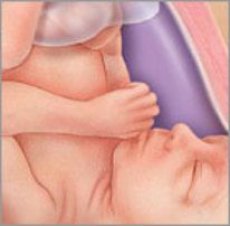Medical expert of the article
New publications
Pregnancy: 25 weeks
Last reviewed: 04.07.2025

All iLive content is medically reviewed or fact checked to ensure as much factual accuracy as possible.
We have strict sourcing guidelines and only link to reputable media sites, academic research institutions and, whenever possible, medically peer reviewed studies. Note that the numbers in parentheses ([1], [2], etc.) are clickable links to these studies.
If you feel that any of our content is inaccurate, out-of-date, or otherwise questionable, please select it and press Ctrl + Enter.

How the child grows:
This week, the baby is 35 cm tall and weighs 700 grams. He is starting to gain weight and his skin is smoothing out. His hair is also growing and its color and texture can already be determined.
Important: Each baby's development is unique. Our information is designed to give you a general idea of fetal development.
Changes in the expectant mother
Baby isn't the only person with a full head of hair at this stage. Your hair may appear thicker and shinier due to hormonal changes.
You may also notice that you are not moving as gracefully. If your doctor does not recommend that you stop exercising, continue to do so, but remember to follow some safety rules: do not exercise if you are overly tired, or if you have pain, dizziness, or shortness of breath. Do not lie on your back or do exercises that increase the risk of falling. Drink more water, and begin your exercise routine with a warm-up.
When you have your blood sugar test, usually at 24 to 28 weeks, you may also be tested for anemia. If your blood tests confirm iron deficiency anemia (the most common type of anemia), your doctor will likely recommend taking iron.
Constipation: "To relieve constipation, add oatmeal or wheat bran to breads, yogurt, or even sauce." - Christina
3 Questions About... Prenatal Care in the Third Trimester
How often should you visit a doctor?
Between 28 and 36 weeks, you will come for check-ups every two weeks. A month before the birth, the number of consultations will increase to once a week.
How will the consultations take place?
- Your doctor will ask you about your physical and emotional well-being, as well as any problems that have arisen since your last consultation. Your doctor will also ask about any vaginal discharge or bleeding that you may have. Let them know if you have any symptoms that you haven’t discussed.
- The doctor will ask about the child's movements. Be sure to tell him if you notice that the child has become less active.
- The doctor will measure your weight and test your urine to check for preeclampsia, urinary tract infections, and other problems. The doctor will also take your blood pressure and check for swelling in your ankles, hands, and face.
- The doctor will measure the baby's heartbeat and check its position, as well as measure the abdominal circumference and the distance from the pubic bone to the top of the uterus to monitor the growth rate.
- The doctor may check the cervix.
- Your doctor will look for symptoms of preterm labor, preeclampsia, and other warning signs.
- Your doctor will be available to discuss any questions you may have about your birth, so you may want to reconsider your list of questions.
- Discuss with your doctor questions about breastfeeding and methods of postpartum contraception.
What tests can a doctor prescribe?
Depending on your situation, you may be ordered to have the following tests:
- Hematocrit/hemoglobin index
- Detection of gestational diabetes.
- Rhesus antibody screening: If you are Rhesus negative, antibody screening will be repeated at 28 weeks.
- Screening for sexually transmitted infections: Your doctor will take a swab to check for chlamydia and gonorrhea, and your blood will be tested for syphilis.
- Group B Strep Test: Between 35 and 37 weeks, a test will be performed to check for group B strep in the vagina and rectum. If the test is positive, no immediate treatment is given. Instead, antibiotics will be given intravenously at birth.
- Biophysical profile of the fetus.
This week's activity: Make time for your partner this week. Show affection to your partner: go on a romantic walk, tell him you love him and how important his support is to you. Tell him he will be a wonderful father to your child and explain why. Close physical and emotional contact will help you become closer.


 [
[